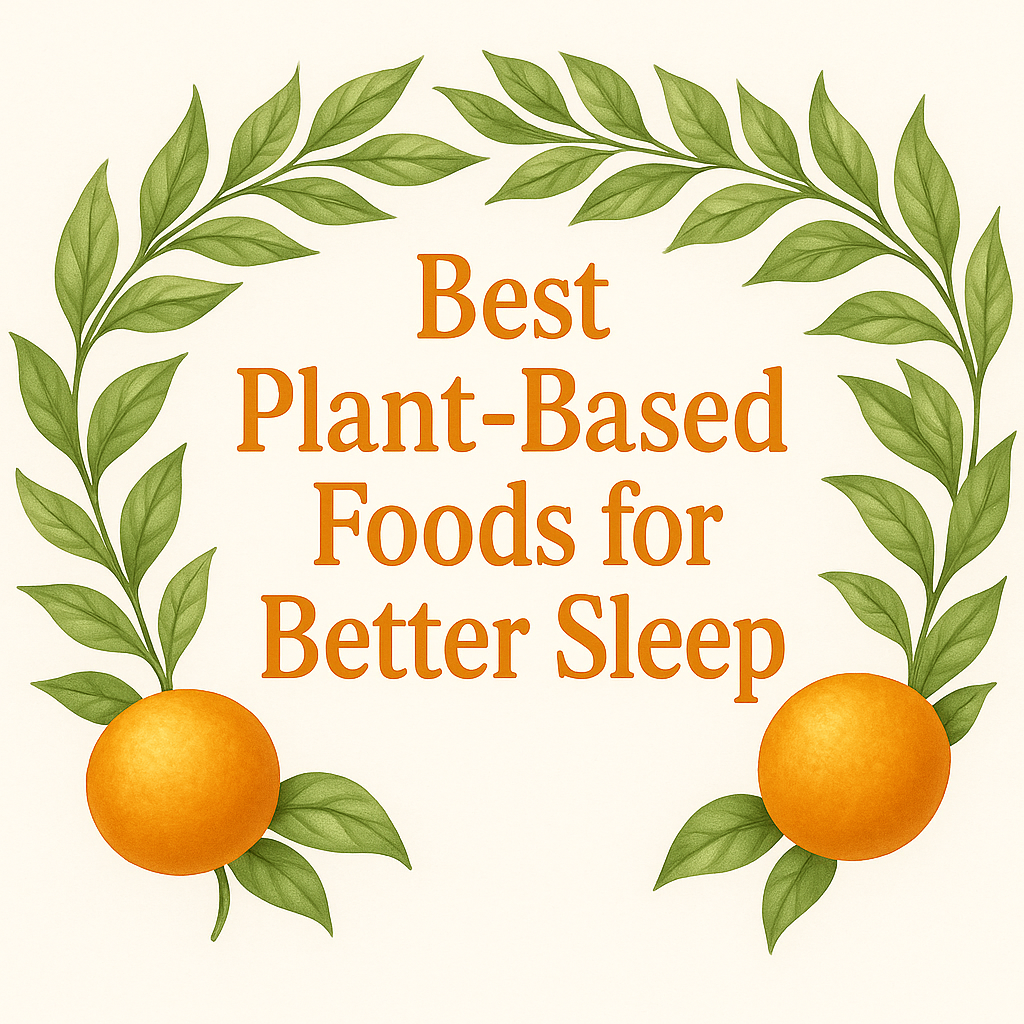Struggling to fall asleep, even when you’re exhausted? It turns out the foods you eat—especially plant-based foods rich in magnesium, tryptophan, and natural melatonin—can make a real difference in how quickly you fall asleep and how well you stay asleep. In this article, we’ll explore the best plant-based foods for better sleep and how to build an easy, relaxing nighttime routine using everyday ingredients.
The connection between food and sleep isn’t just old wives’ tales. Your body actually uses specific nutrients from plants to produce the hormones and chemicals that help you drift off naturally. And the best part? You don’t need expensive supplements or complicated routines. The answers might already be sitting in your kitchen.
Why Plant-Based Foods for Better Sleep Actually Work
Your body has its own built-in sleep system, but it needs the right raw materials to function properly. Think of it like a factory that makes sleepiness—without the right ingredients, production shuts down. Plants provide these ingredients in forms your body recognizes and can use efficiently.
Unlike synthetic sleep aids that can leave you groggy, plant-based foods work with your natural rhythms. They provide nutrients that help your brain produce melatonin (your sleep hormone), relax your nervous system, and even support the gut bacteria that influence sleep quality.
The Sleep-Supporting Superstars
1. Avocados: A Magnesium-Rich Food That Calms the Nervous System
Avocados aren’t just Instagram-worthy—they’re packed with magnesium, a mineral that acts like a natural chill pill for your nervous system. One medium avocado contains about 58mg of magnesium, which helps regulate GABA, your brain’s main calming neurotransmitter.
But here’s the really cool part: avocados also contain healthy fats that help your body absorb other sleep-promoting nutrients more effectively. Try mashing half an avocado on whole grain toast about 2 hours before bed, or blend it into a evening smoothie with some tart cherry juice.
2. Almonds: A Natural Source of Melatonin and Sleep-Friendly Protein
Almonds are like nature’s sleep medication, but without the side effects. They contain tryptophan, the amino acid your body converts into serotonin, which then becomes melatonin. A small handful (about 23 almonds) provides around 0.02mg of melatonin—not huge amounts, but enough to support your body’s natural production.
The magnesium in almonds (about 80mg per ounce) also helps quiet your nervous system. Plus, the protein helps keep your blood sugar stable through the night, preventing those 3 AM wake-ups that leave you feeling wired.
3. Tart Cherries: The Best Natural Melatonin Food for Deeper Sleep
If you’re serious about improving your sleep naturally, tart cherries should be your new best friend. Research published in PubMed shows that tart cherry juice can significantly improve sleep quality and duration in adults with insomnia.
Tart cherries contain one of the highest natural concentrations of melatonin of any food—up to 6 times more than sweet cherries. They also provide anti-inflammatory compounds that help reduce the stress and inflammation that can keep you tossing and turning. Chronic stress is a major sleep disruptor. Here’s how to calm your body with stress-reducing foods.
Try drinking 8 ounces of tart cherry juice about 2 hours before bed, or snack on a handful of dried tart cherries (just watch the added sugar).
4. Kiwis: Boost Serotonin and Sleep Quality with This Vitamin C Superfruit
This one might surprise you, but kiwis are actually incredible for sleep. Studies have shown that eating two kiwis an hour before bed can help you fall asleep 42% faster and sleep 13% longer.
Kiwis are rich in serotonin, which helps regulate your sleep-wake cycle. They also contain vitamin C, which may help reduce cortisol (stress hormone) levels that can interfere with sleep. The antioxidants in kiwis, particularly vitamin E, may also play a role in protecting your sleep quality.
5. Turmeric Golden Milk: The Anti-Inflammatory Bedtime Drink
Turmeric-based drinks have become the evening ritual for many people trying to improve their sleep naturally, and for good reason. Curcumin, the active compound in turmeric, has powerful anti-inflammatory properties that can help reduce the chronic inflammation that interferes with sleep.
But here’s the key: turmeric works best when combined with black pepper (which increases absorption) and a healthy fat like coconut milk. The warm, creamy texture of golden milk also triggers your body’s relaxation response, making it the perfect bedtime ritual.
6. Legumes: Complex Carbs and Plant Protein for Sleep Support
Beans, lentils, and chickpeas might not scream “bedtime snack,” but they’re actually fantastic plant-based foods for better sleep. They’re rich in complex carbohydrates that help tryptophan cross the blood-brain barrier more effectively, leading to better serotonin and melatonin production.
Legumes also provide magnesium, iron, and B vitamins that support healthy sleep patterns. The fiber in legumes feeds beneficial gut bacteria, which produce neurotransmitters that influence sleep quality.
The Science Behind Plant-Based Sleep Support
Understanding how these nutrients work together helps explain why plant-based foods for better sleep are so effective:
Tryptophan → Serotonin → Melatonin: This is your body’s natural sleep pathway. Tryptophan (found in nuts, seeds, and legumes) converts to serotonin, which then becomes melatonin when it gets dark.
Magnesium: Acts as a natural muscle relaxant and helps regulate GABA, your brain’s “brake pedal” that slows down racing thoughts.
Complex Carbohydrates: Help tryptophan compete better with other amino acids to cross into your brain, where it can do its sleep-promoting work.
Antioxidants: Reduce inflammation that can interfere with sleep quality and help protect your sleep-regulating brain cells.
Why Patterns Matter More Than Perfect Foods
Here’s something important: eating one serving of cherries won’t magically fix your sleep problems. What works is adopting a whole plant-based approach that consistently provides your body with sleep-supporting nutrients throughout the day.
People who eat predominantly plant-based diets tend to have better sleep quality overall compared to those who eat more processed foods. This isn’t just about individual nutrients—it’s about creating an environment in your body where sleep happens naturally.
Your Evening Plant-Based Sleep Ritual
The trend of evening plant-based snacks isn’t just social media hype—it’s becoming mainstream because it works. Here are some simple combinations that can become your new bedtime routine:
The Classic Sleepy Smoothie: Blend 1/2 banana, 1/4 cup tart cherry juice, 1 tbsp almond butter, 1/2 cup oat milk, and a pinch of cinnamon. The banana provides magnesium and potassium, while the oats add complex carbs to help tryptophan absorption.
Golden Milk Oatmeal: Make a small bowl of oatmeal with coconut milk, add 1/2 tsp turmeric, a pinch of black pepper, and top with chopped almonds. This combines multiple sleep-supporting foods in one comforting bowl.
The Kiwi-Almond Combo: Simply slice 2 kiwis and enjoy with a small handful of almonds. Sometimes the best solutions are the simplest ones.
Avocado Toast with a Twist: Mash half an avocado on whole grain bread, sprinkle with hemp seeds (more magnesium!), and have with a small glass of tart cherry juice.
Timing Is Everything
When you eat these sleep-supporting foods matters almost as much as what you eat. Aim to have your evening snack 1-2 hours before bed. This gives your body time to digest and start producing sleep hormones without keeping you awake with an active digestive system.
Avoid large meals within 3 hours of bedtime, but don’t go to bed hungry either. A light snack that combines protein, healthy fats, and complex carbs is your sweet spot.
The Gut-Sleep Connection
Here’s something fascinating: about 90% of your body’s serotonin is actually produced in your gut, not your brain. This means the health of your digestive system directly impacts your sleep quality.
Plant-based foods support beneficial gut bacteria that produce neurotransmitters affecting sleep. The fiber in fruits, vegetables, and legumes feeds these good bacteria, creating a positive cycle that supports both digestive health and better sleep.
These foods also support a healthy gut microbiome—check out our post on how to improve gut health naturally for more tips.
Beyond Individual Foods: The Bigger Picture
While focusing on specific plant-based foods for better sleep is helpful, remember that your overall eating pattern matters more than any single food. Diets rich in whole plant foods naturally provide the nutrients your body needs for healthy sleep cycles.
Avoid foods that can disrupt sleep, especially in the evening: excessive caffeine, alcohol, high-sugar snacks, and large, heavy meals. These can interfere with your body’s natural sleep preparation process.
Making It Sustainable
The key to long-term success with plant-based foods for better sleep isn’t perfection—it’s consistency. Start by adding one or two sleep-supporting foods to your evening routine. Maybe it’s a small handful of almonds with your herbal tea, or adding some tart cherries to your yogurt.
As these habits become natural, you can experiment with different combinations and find what works best for your body and schedule. Some people love the ritual of making golden milk, while others prefer the simplicity of sliced kiwi.
When to Expect Results
Unlike prescription sleep aids that work immediately, plant-based sleep support takes time. You might notice small improvements within a few days, but significant changes typically take 2-4 weeks of consistent habits.
Be patient with the process. Your body is learning to support its natural sleep rhythms again, and that takes time. Keep a simple sleep diary to track how different foods affect your sleep quality—you might be surprised by the patterns you discover.
The Bottom Line
Plant-based foods for better sleep aren’t just trendy—they’re backed by science and centuries of traditional use. By providing your body with the nutrients it needs to produce its own sleep hormones and reduce inflammation, these foods work with your natural biology rather than against it.
Start small, be consistent, and remember that good sleep is an investment in every aspect of your health. Your body has an incredible ability to heal and restore itself during sleep, but it needs the right fuel to make that happen.
Sweet dreams are made of plants—and now you know exactly which ones to choose.
Frequently Asked Questions (FAQs)
What plant-based foods help you sleep through the night?
Tart cherries, almonds, and complex carbs from legumes are top options. These support melatonin production, regulate blood sugar, and calm the nervous system.
When should I eat sleep-promoting foods?
Aim to eat your evening snack 1–2 hours before bedtime. This gives your body time to digest and begin producing sleep-inducing hormones naturally.
Can a plant-based diet improve sleep long-term?
Yes! Diets rich in whole, plant-based foods are associated with better overall sleep quality, especially when consistently followed over time.






0 Comments